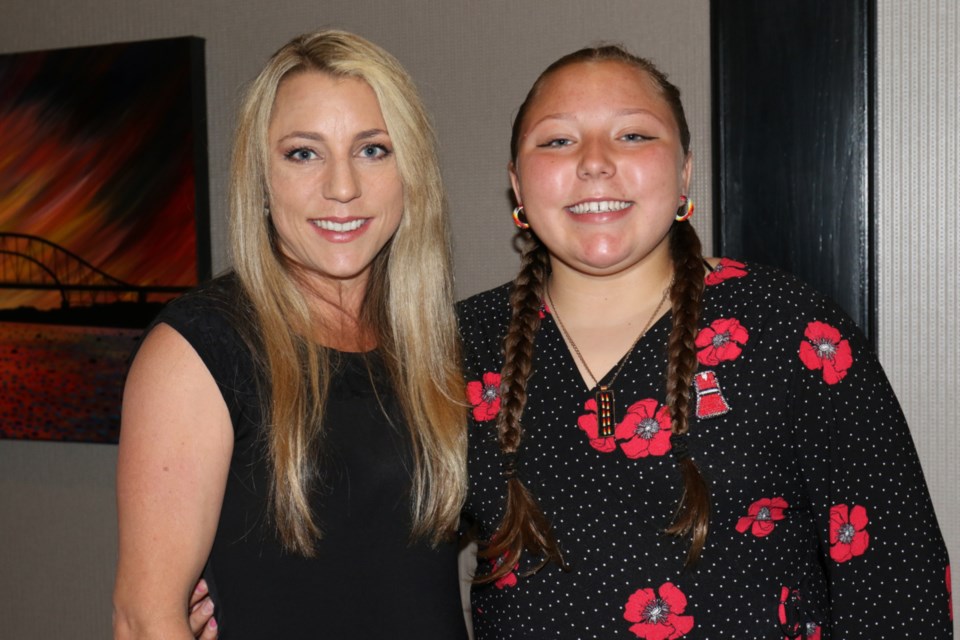Neveah Pine delivered an impassioned speech about missing and murdered Indigenous women during the Honouring Our Sisters gathering Wednesday.
It’s the same speech that won the 13-year-old Garden River First Nation member first place in a provincial public speaking competition hosted by the Royal Canadian Legion in Niagara Falls this past May.
“I felt pretty proud of myself, and just good that I was doing my part,” Pine told SooToday following her speech.
Pine says that she was inspired to author the speech after doing research on missing and murdered Indigenous women and girls across Canada.
“There was not a lot of information when you just googled it, so you had to watch many documentaries,” she said. “Me and my Mom watched quite a bit of documentaries, and it made us sad about it.”
Her mother, Natalie Pine, was trying to fight back tears following her daughter’s presentation.
“I’m proud of her for having the courage to stand up and speak,” she said. “At the same time, her words are very impactful as a mother, because it’s terrifying.”
“It makes you think about the families that are missing people must go through. I’m proud of her for speaking up.”
Here is a transcribed version of the speech Pine authored when she was 12 years old, and delivered during the Honouring Our Sisters gathering:
If I went missing, would you look for me?
Would you see my face all over the news?
Would you care?
Would you demand to know what happened to that girl?
Have they found her?
You might be wondering, ‘Why is this girl so worried about disappearing?’
It’s because statistics show that I need to be.
I am five times more likely to go missing than other women and girls.
I am 12 years old.
I am Indigenous.
I chose this topic because I hope by hearing me today, it might help spread awareness to this horrible fact happening in our country.
It has been called the hidden human rights crisis and national tragedy:
The missing and murdered Indigenous women and girls of Canada.
The issue of these missing women in Canada is as old as Canada itself.
Indigenous women in communities have long called out for help to the high rates and appalling numbers, but their calls were ignored by the federal government.
Finally, in 2016, the government launched a national inquiry for these women, but most families are still waiting for answers on the countless unsolved cases.
1,200 is a documented number of missing and murdered Indigenous women in 30 years, but experts say the numbers are much greater.
These women are someone’s mother, someone’s daughter.
These women are someone.
Many of these women were completing their education - women like Loretta Saunders, an Inuk woman who was murdered at the age of 26.
Loretta was completing her honours thesis on this very subject, when she herself went missing in 2014.
Maisy Odjick and Shannon Alexander were 16 and 17 years old, and were last seen Sept. 8, 2008 at a school dance.
Police called them runaways, but Maisy’s mother said she would’ve called after seeing her family crying for her.
Tina Fontaine was 15 years old.
Her body was pulled from the Red River in Winnipeg, where many other women were found.
It was Tina Fontaine’s case that made an impact, and people had begun to realize the truth of this hidden crisis and open their eyes.
There are groups and organizations rising up to make a difference and find out why so many Indigenous women are victims of violence, when they make up only four per cent total number of women in Canada.
Every year, we gather outside the courthouse to drum and sing and send prayers to heal the families who are suffering.
Everyone is welcome to join and stand up for these women.
But once a year is not enough.
The dangerous stereotypes have allowed people to make excuses and not look or help these women and families properly.
It is time to stand up and to stop this, to bring our voices together and not let this continue in our country.
How do you stop a bully?
You stand together and say, ‘No, this is not OK.’
I believe we all have a place on the medicine wheel.
We can all make a difference.
There is a message being shared across social media, the author is unknown:
‘I am a strong Anishinaabe woman.
I am content.
If there ever comes a time where I go for groceries and don’t return, where I go to school or a friend’s house and don’t come home
No, I did not voluntarily leave my family.
I am not out partying.
If there ever comes a time where I don’t return, know someone took me against my will.
Don’t make excuses as to why I may not have returned.
Look for me. Please.’
These women did not get the media coverage they deserved.
They did not ask to be taken.
We need to stop victim blaming and stand together.
We need to do something, because no one asks to disappear.
